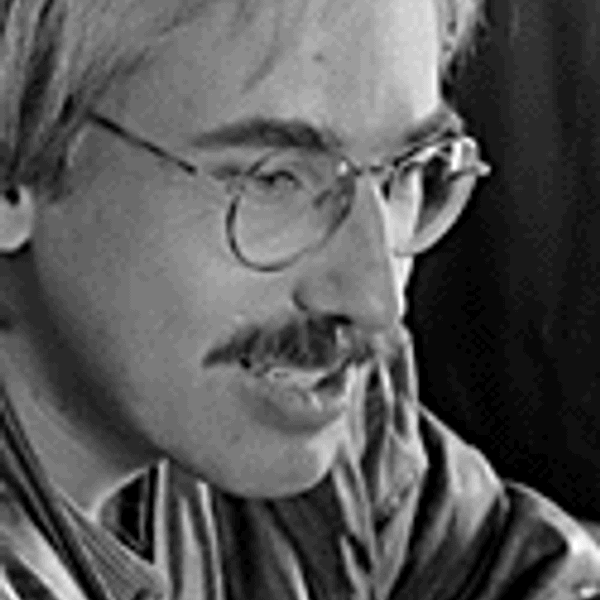Art by Jin Suk
Editor’s Note
In soliciting work for this issue’s special feature, Lairs of God: Spirituality After Silicon Valley, we sent prospective contributors the following paragraph:
"May God us keep/from single vision and Newton's sleep," prayed Blake. And the prayer, we might say, was answered. Newton's sleep gave way to Einstein's nightmare: the canonization of the alpha and the omega of the split atom. Technology, Heidegger proposed, is in itself neither demonic nor divine, but is a "way of revealing." The essence of the revelation, however, remains mysterious. What are the promises implicit and explicit in the Gospel of Apple? With all the space (which the microchip seems intent on transforming into the equivalent of time) devoted even in the literary press to questions rising around the increasing hegemony of computers and word processors, are we to assume technology has been humanized? Or has humanity been technologized? When we reflect on machines, what is it we are reflecting on? Is the ghost in the machine a plausible substitute for a shapelier muse? Or does it aim merely to keep us amused? More specifically, how in 1987 is the spiritual life affected by the (divinization of the) computer?
Old questions which, we feel, deserve a few new replies. You are of course invited to take issue with any of the above remarks.
Not long after mailing out these notes, the latest issues of Sulfur and NER/BLQ arrived at our office, both containing a number of essays on technology and computers. Among several provocative pieces perhaps the strangest was Robert Avens’ recapitulations in Sulfur of the theories of the Jungian Wolfgang Giegerich. Giegerich argues that far from being, as it is conventionally fobbed off, the brain child of the enlightenment, the technological revolution is in fact the honest heir of evolutionary Christian thought.
So while it may be true, as one of our contributors claims, that our paragraph raises a number of by now hoary symposia topics, it appears there’s still a need for nervous lay people to keep applying their own categories to the activities of researchers in their sister culture who, it ought to be noted, themselves have little to say about the burning issues of minimalism or the new formalism.
Now literary people may not have been the right types to receive these questions. Clearly they do not worship technology. They are, on the contrary, quite capable of regarding the matter from the proper ironic distance. It is to the others—that segment of our society which studies technical manuals with a care once reserved for more sacred texts—that the prophetic voices in this issue, those of Marilynne Robinson and Baron Wormser, are mainly addressed. Or perhaps they speak to the rest of us as well. After all, as Aeschylus tells it, before Prometheus brought fire to earth, man was born knowing the precise date of his death. That knowledge was lost when man accepted the titan’s gift. Until the arrival of this avatar of the split atom, people lived in full awareness of their mortality which, in turn, kept them from trying to compete with gods. That kind of courtesy and humility seem largely gone from the world. It’s the job of the apocalyptic voice, from the Upanishads to Saint John to Blake to the growing body of contemporary literature composed in its spirit, to remind us of that which we would all too readily forget.
A.M.
August 1988

Askold Melnyczuk—the founding editor of AGNI, for which he received the PEN/Nora Magid Award for Magazine Editing—is the author of four novels and a book of stories. What Is Told (Faber, 1994), was the first commercially published work of fiction in English to highlight the Ukrainian refugee experience and was named a New York Times Notable. Other novels have been selected as a Los Angeles Times Best Book of the Year and an Editor’s Choice by the American Library Association’s Booklist. His most recent book is a collection of stories, The Man Who Would Not Bow. His selected poems, The Venus of Odesa, is forthcoming from Mad Hat in summer 2025. A book of selected nonfiction, With Madonna in Kyiv: Why Literature Still Matters (More than Ever), will be published by Harvard University Press in 2026. He has edited a book of essays on the St. Lucian Nobel Prize–winning poet Derek Walcott and is coeditor of From Three Worlds, an anthology of Ukrainian writers from the 1980s generation. He's the recipient of a Lila Wallace-Reader's Digest Writers Award for fiction, the Heldt Prize for translation, and the George Garret Award from AWP for his work in the literary community. Individual poems, stories, essays, and translations have appeared in The New Yorker, The Paris Review, The Gettysburg Review, The Missouri Review, and elsewhere. Also the founder of Arrowsmith Press, he has taught at Boston University, Harvard, and Bennington College and currently teaches at the University of Massachusetts Boston. (updated 5/2025)
